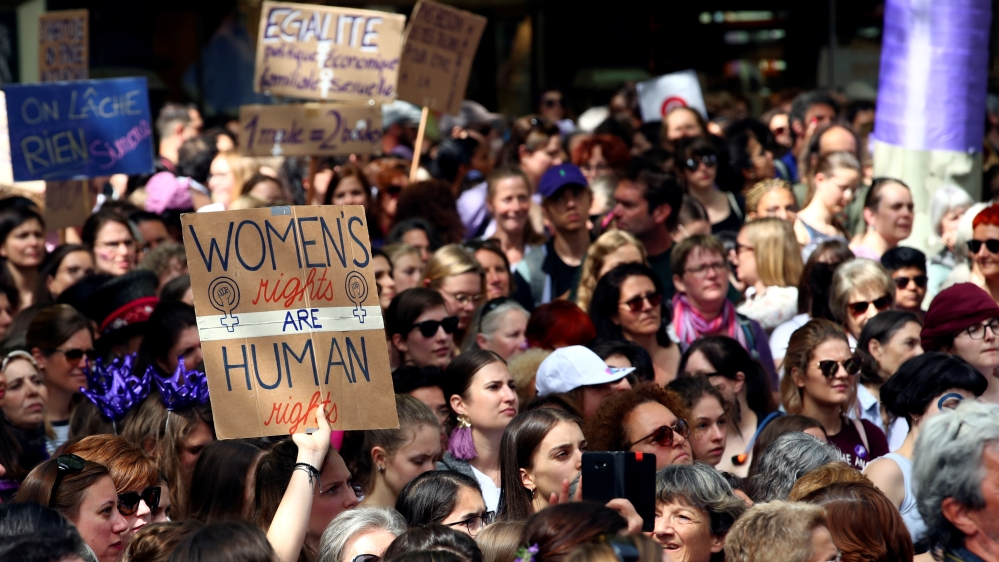Why the way women are portrayed by the media matters
https://arab.news/j76hm

Like any normal and easily distracted person, I often find myself scrolling through endless pages of social media posts. Between the latest beauty trends and the current state of affairs, I stumble upon a few “non-official” local media accounts that never fail to stir controversy.
Over the past few months, I have noticed an increase in the frequency of posts that are negative about women. These posts do not necessarily attack women directly, but they include content and innuendoes that paint women in a negative light. In a matter of a week, for example, one account posted these headlines: “Revenge on her ex-husband — the motto of some divorcees,” “Woman files for divorce because she can’t stand her husband,” “Women encourage others to seek divorce for unreasonable reasons,” and “Study shows women measure a man’s affection with material things and not emotions.” They even pose questions aiming to stimulate male discussions, such as “Should you choose to marry a stay-at-home woman or one that works?”
These accounts go as far as attempting to normalize and encourage delicate social subjects, such as polygamy, by posting successful outliers like the case of the Gulf wife who planned and paid for her husband’s second marriage. In the same week, the same account also conveniently selected some secondary observations from an old study by the University of Sheffield to demonstrate that polygamy has multiple positive benefits for the husband.
What many might disregard as harmless online banter or random social observations and discussions can have real negative repercussions in the long run. These messages are, by their nature, misogynistic, stereotypical and sexist. The real threat, however, lies in the fact that they can actually influence public opinion.
Comments turn into discussions, which can develop into a wider debate and be picked up by official news media channels or even government institutions. This was evident when a simple post was published that presented the court case of a divorced woman demanding “unreasonable” alimony from her ex-husband. The online debate became very heated and it was eventually discussed by members of the UAE’s Federal National Council.
I will not delve into how these messages reinforce archaic notions of patriarchy and moral authority. Nevertheless, it is imperative to highlight that it is becoming more and more difficult to accept the randomness of these posts. Instead, they could be a deliberate attempt to normalize controversial subjects and undermine the image of women.
What many might disregard as harmless online banter or random social observations can have real negative repercussions.
Asma I. Abdulmalik
These accounts are not official, nor do they belong to private corporations, but are instead individual efforts by citizens. Their influence has grown over the years and they now have hundreds of thousands of followers. They post the latest local news, sometimes even before the official channels, as well as social issues and entertaining videos. In fact, most of the content is recycled material from international tabloids, such as the UK’s Daily Mail, or has been cherry-picked from local court cases. Their comparative advantage lies in their wide public outreach and the lack of official accountability.
What is unfortunate, however, is that they champion messages that absolutely contradict what official government establishments and media outlets advocate daily. Official media accounts spare no expense in highlighting all the great successes women have achieved over the years. They celebrate every break in the glass ceiling and provide all possible means for women to excel outside of their preconceived gender roles.
Over the course of history, women have been defined in very narrow roles. This comes as no surprise, since the media was managed exclusively by men and images and content were tailored to men’s preferences. However, much of the media has now come a long way, from exploiting women’s images and sexuality to now portraying them as independent and powerful. This is why it matters how we portray women in the media.
The mass media is clearly no longer just about informing. It plays an important role in shaping society and swaying public opinion. It influences our priorities and is a vehicle for changing our laws and policies. It carries a great responsibility in raising awareness of the pressing and relevant matters that concern us, as well as promoting messages that inform, engage and educate for the betterment of every group in society. What we all want is to foster a society that promotes and respects both men and women. It is thus more important than ever to understand that the media accounts and individuals that continue to produce discriminatory and insulting stereotypes about women should no longer be entertained.
- Asma I. Abdulmalik is an Emirati civil servant and a writer interested in gender and development issues. Twitter: @Asmaimalik







































